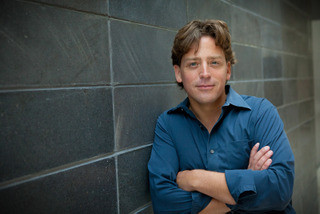|
Back
A challenging evening of recent works Toronto
Koerner Hall
05/22/2014 -
Christos Hatzis: String Quartet No. 3 (The Questioning) [1]
Brian Current: Faster Still for violin, piano and string quartet [2]
R. Murray Schafer: Quintet for Piano and Strings [3]
4. Louis Andriessen: Anaïs Nin [4]
Afiara String Quartet [1],
Véronique Mathieu (violin), Claudia Chan (piano), Nyx Quartet, Brian Current (conductor) [2], ARC Ensemble [3], Wallis Giunta (mezzo-soprano), Véronique Mathieu (violin), 21C Ensemble [4]

B. Current (© Brian Current)
Toronto’s Royal Conservatory of Music has just concluded 21C: its first annual festival of 21st century music, with eight concerts in five days (May 21-25). The second concert, entitled “Faster Still Anaïs Nin” sounds like the title of a Frank O’Hara poem, but refers to two of the evening’s four works. Each work was performed by a separate group of players, all of whom have a connection with the conservatory.
The evening started with a world premiere by Christos Hatzis, a professor of music at the University of Toronto, performed by the conservatory’s quartet in residence, the Afiara Quartet. Hatzis specializes in electro-acoustic music; accordingly, the String Quartet No. 3 opens with a recording of a Greek Orthodox chant in praise of God (performed by a priest from Hatzis’ home town of Volos) - but the ensuing work reflects the composer exploring “the psychological conditions which ultimately lead one to atheism”. It is in three movements: Affirmation, Denial, and Epiphany.
The first movement echoes the “slippery” tonalities of the Orthodox chant. It has both playful and quietly introspective sections and is, on the whole, tonal, unlike the “aggressive” (composer’s description) second movement. In the final movement, described as “devoid of ambition”, a musical duality emerges. The short, rather inconclusive, movement leaves a ruminative impression - appropriate for a piece subtitled The Questioning and representing the composer’s working through his attitude toward his religion.
The next work was Faster Still by Brian Current, who heads the conservatory’s New Music Ensemble and was 21C Artistic Advisor. The focus of the work is on constantly-changing tempos; this emphasis results in a monochromatic impression, but alleviated by flashing interjections from the pianist (Claudia Chan). It is quite the dashing work and almost amounts to a mini violin concerto - especially as it was conducted by the composer. Violin soloist Véronique Mathieu maintained a fine focus while the Nyx Quartet (incoming quartet in residence at Rice University in Texas) provided alert support.
The first half of this very full evening concluded with R. Murray Schafer’s Quintet for Piano and Strings, first performed in 2012 in Vancouver. It was commissioned by the ARC Ensemble (ARC = Associates of the Royal Conservatory) while Schafer was composer-in-residence at the conservatory. It is in three movements (apparently unnamed), the first very vigorous and extroverted, even giddy. The second is elegiac, with an abrupt end. The third resumes the liveliness of the opening and reminds one of a playful work by Shostakovitch. Quite the brisk audience-pleaser. The youthful 80-year-old composer was on hand for the accolades.
The second half of the evening was devoted to Dutch composer Louis Andriessen’s Anaïs Nin, a multi-media work with video introduction and interludes (Valerie Buhagiar, videographer). It calls for a solo mezzo-soprano accompanied by a group of seven players (here the 21C Ensemble). It premiered in Amsterdam in 2010 and there is a sound recording (i.e. minus the visuals). It sparks comparisons with two other monodramas from the past century, Arnold Schonberg’s Erwartung, composed in 1909, and Francis Poulenc’s La voix humaine from 1958, but the absence of texts (either printed or projected) created a barrier to comprehending the work.
It is impossible to predict what the future is for this piece. Even if it were performed without the visuals, it requires the singer to be amplified. Wallis Giunta can easily project her lovely, expressive voice in the friendly acoustic of Koerner Hall, but the composer has decided to accompany the singer with brass instruments (with the aim of conjuring up the jazz era of Nin’s diaries). The amplification (relatively discreet as it is) helps her override the competing (vs supporting) tones of the instruments. Unfortunately the visuals did not include the text which tells of, or ruminates upon, the author’s eventful sex life during which her partners included Henry Miller, her psychiatrist (one René Allendy), Antonin Artaud (the Theatre of Cruelty guy), and her own father, a pop composer named Joaquin Nin. One line that leapt out from the torrent of words was “I once fucked my dad.” It is hard to tell whether this is supposed to be a source of anguish or what - it seems that the performer is to get worked up through a surfeit of introspection. The work ends with a vintage recording of one of Joaquin Nin’s compositions. The piece prompted a few walk-outs. It was an uphill battle to figure out what was being enacted and the abrasive accompaniment quickly lost its charms.
Anaïs Nin was deftly staged by Liza Balkan. Wallis Giunta was dressed and made up to look astonishingly like Anaïs Nin as well as the woman portraying her in the projected video. Ms Giunta (not that long ago a student at the RCM) gave a brave performance.
All in all, an adventurous evening. Having each piece performed a a separate ensemble certainly helped showcase the depth and breadth of talent within the RCM as well as ensuring thorough preparation of each challenging piece. It seems a bit odd to begin getting an overview on the music of a century that is not yet 14 years old but that is what these C21 Festivals will eventually do.
Michael Johnson
|